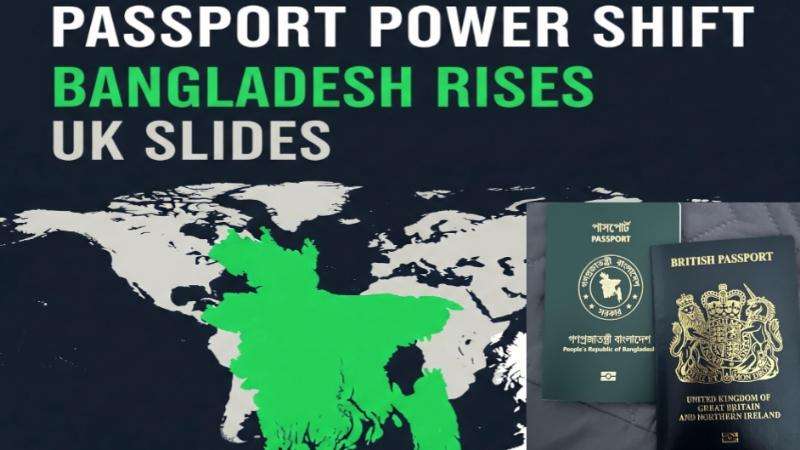The latest mid-year Henley Passport Index for 2025 reveals a notable upward trajectory for the Bangladeshi passport, which has climbed three spots to rank 94th globally. This marks a consistent improvement from its lowest point in 2021 (108th), with steady gains through 2022 (103rd) and 2023 (101st). Currently, Bangladeshi passport holders enjoy visa-free access to 39 destinations worldwide, Daily Dazzling Dawn understands.
This positive development for Bangladesh contrasts sharply with the ongoing decline of the United Kingdom's passport. Once a global leader, holding the top spot in 2015, the UK passport has now dropped to 6th place, continuing a long-term downward trend. The UK currently provides visa-free access to 186 destinations, a significant figure but a considerable fall from its former prominence. This decline mirrors that of the United States, which has slipped to 10th place with visa-free access to 182 destinations, teetering on the edge of exiting the Top 10 for the first time in the index's two-decade history.
Dr. Christian H. Kaelin, the inventor of the passport index concept, emphasizes that "access is earned – and must be maintained – through active and strategic diplomacy." This underscores the dynamic nature of global mobility, where nations that proactively negotiate visa waivers and nurture reciprocal agreements tend to rise.
For Bangladesh, the 39 visa-free destinations include diverse locations such as the Bahamas, Barbados, Bhutan, Bolivia, British Virgin Islands, Burundi, Cambodia, Cape Verde Islands, Comoro Islands, Cook Islands, Djibouti, Dominica, Fiji, Grenada, Guinea-Bissau, Haiti, Jamaica, Kenya, Kiribati, Madagascar, Maldives, Micronesia, Montserrat, Mozambique, Nepal, Niue, Rwanda, Samoa, Seychelles, Sierra Leone, Somalia, Sri Lanka, St. Kitts and Nevis, St. Vincent and the Grenadines, The Gambia, Timor-Leste, Trinidad and Tobago, Tuvalu, and Vanuatu.
In the broader global landscape, Singapore continues to reign supreme with visa-free access to an impressive 193 destinations. Japan and South Korea share second place, offering access to 190 destinations each. European nations dominate the top ranks, with seven EU passports (Denmark, Finland, France, Germany, Ireland, Italy, and Spain) sharing 3rd place with access to 189 destinations. Another seven-nation European group, including Austria, Belgium, Luxembourg, Netherlands, Norway, Portugal, and Sweden, are joint 4th with 188 destinations. New Zealand ties for 5th place alongside Greece and Switzerland.
At the other end of the spectrum, Afghanistan remains at the bottom of the ranking, with its citizens able to access only 25 destinations without a prior visa, highlighting a vast global mobility gap.
Looking at the past decade, while many passports have gained power, only 16 have seen a decline in rank. Venezuela has experienced the most significant fall, plunging 15 places, followed by the US (down eight places), Vanuatu (six places down), the UK (lower by five places), and Canada (slipping four places).
Deeper Dive into UK-Bangladesh Dynamics:
The contrasting passport fortunes occur within a multifaceted relationship between Bangladesh and the UK. While the UK's passport mobility declines, its engagement with Bangladesh remains significant, particularly in trade, development, and diaspora relations.
UK's Stance on Bangladesh: The UK has been a vocal supporter of Bangladesh's democratic recovery following the formation of the Interim Government in August 2024. British Minister for the Indo-Pacific, Catherine West, visited Bangladesh in November 2024, signaling continued commitment. The UK has also announced new funding to support Rohingya refugees and host communities in Bangladesh, alongside assistance for natural disaster victims. High Commissioner Sarah Cooke has reiterated the UK's readiness to assist Bangladesh in banking, revenue, and capital market reforms.
Trade and Economic Ties: The UK remains one of Bangladesh's most significant trading partners, with bilateral trade reaching £3.9 billion in the four quarters leading up to Q4 2024. While there was a slight decrease of 6.5% compared to the previous year, both nations are committed to enhancing trade. The UK's newly launched Industrial Strategy aims to deepen economic partnership, focusing on high-growth sectors. The recent upgrades to the UK's Developing Countries Trading Scheme (DCTS) will benefit British consumers with competitively priced imports and ensure Bangladesh continues to receive zero tariffs on products like garments and electronics, fostering stronger supply chains. The International Trade Centre also recently concluded the "SheTrades UK - Bangladesh Market Linkages Programme" in June-July 2025, promoting women-led businesses.
Bangladeshi Diaspora in the UK: The UK hosts the largest Bangladeshi community in Europe, with over 650,000 British Bangladeshis, a population that has significantly grown to over 1 million by 2025 estimates. Concentrated heavily in London, particularly East London boroughs, this diaspora is a vital bridge between the two nations, contributing over $1.5 billion annually in remittances. A new initiative, "Bridge to Bangladesh," launched in London in May 2025, seeks to further channel diaspora resources, skills, and investments into Bangladesh's national priorities, including climate resilience and inclusive economic growth. This initiative actively involves second-generation British Bangladeshis, aiming to bridge intergenerational divides and leverage their expertise for Bangladesh's development.
Visa Requirements for Bangladeshi Citizens to the UK: While the Bangladeshi passport is gaining strength, Bangladeshi citizens still generally require a visa to enter the UK. For short stays, a Standard Visitor visa is necessary, requiring an online application, biometrics appointment, and supporting documents. The UK has also introduced an Electronic Travel Authorisation (ETA) system for certain nationalities who do not need a visa for short stays, or do not already have a UK immigration status. However, Bangladeshi citizens would generally require a visa. For those seeking to work in the UK, a Skilled Worker visa is available, requiring a Certificate of Sponsorship from a UK employer, meeting a minimum salary threshold, and English language proficiency.
The latest passport rankings underscore the evolving landscape of global mobility. While Bangladesh celebrates its ascent, the UK faces the challenge of reversing its declining passport power amidst its ongoing diplomatic and economic engagements worldwide. The robust and evolving relationship between Bangladesh and the UK continues, shaped by trade, investment, and the significant contributions of the Bangladeshi diaspora.




_2.jpg)



.svg)
